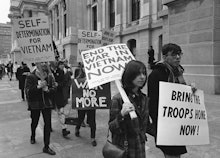Americans Are Now Acting a Whole Lot Like They Did in the 1960s

The news: Polling from the Pew Research Center indicates that President Barack Obama's ambitious mission to reduce American military presence abroad could have substantial support.
Obama's latest agenda for the country's foreign policy, issued Wednesday at West Point, has been described as "one of the most dovish foreign policy speeches by a sitting U.S. president since Eisenhower." In the address, Obama argued that the U.S. should not and cannot use military force except when 100% necessary to defend "core interests" or to "protect our people, our homeland and our way of life."
Obama announced his administration would pursue new policies such as bolstering Syria's neighbors' capacity to host refugees and contain the conflict, shifting the battle against terrorism to regional allies, addressing future threats from China, Russia and Syria with international institutions and accepting that American military power is insufficient to resolve complex conflicts like Nigeria's fight against Boko Haram.
And as Pew polls indicate, this is exactly the shift the public wants in our foreign policy.
The polls: Increasingly, Americans think we should "mind our own business" internationally. And the vast majority believe that the U.S. needs to pay more attention to domestic issues than international ones.
To put this in context, the number of Americans who think we need to mind our own business is higher than it was at the conclusion of the Vietnam War.
What's more, these attitudes aren't incredibly different among partisan lines. From Pew:
"Views on global engagement do not vary much across party lines. Majorities or pluralities of Republicans (52%), Democrats (46%) and independents (55%) think the U.S. does too much to try to help solve world problems, and agree that the U.S. should mind its own business internationally (53%, 46% and 55%, respectively). And close to 8 in 10 among each group agree that the U.S. should concentrate more on our own national problems, rather than thinking so much in international terms (82% of Republicans, 76% of Democrats and 79% of independents)."
Despite this, the public wants the U.S. to remain the sole international military superpower.
But Pew says that an increased tendency toward skepticism about our role abroad hasn't seriously eroded the public's perception that America is still No. 1 when it comes to shooting people and breaking things.
The public also seems to understand that the past decade of military aggression abroad has seriously eroded respect for American power, perhaps tempering enthusiasm for more misadventures in foreign countries.
Pew also found that while there was widespread public support for anti-Russian sanctions on the Ukrainian issue, 62% of the public opposed sending arms or military supplies to the Ukrainian government.
On Syria, a CBS News/New York Times poll in September found that 68% of those surveyed did not think the U.S. had an obligation to intervene and end the ongoing civil war.
Why you should care: America won't be taking a real backseat in international affairs anytime soon, but Obama has essentially announced that we'll be ceding the wheel to our international allies much more in the future. This might disappoint hawkish members of Congress who want to see American muscle flexed on the world stage, but our new, tempered approach to international affairs falls in line with how the public actually wants the U.S. government to act abroad.
And that's a good thing, unless you want another Iraq, Afghanistan or Vietnam. In which case, we hear John McCain is hiring interns.